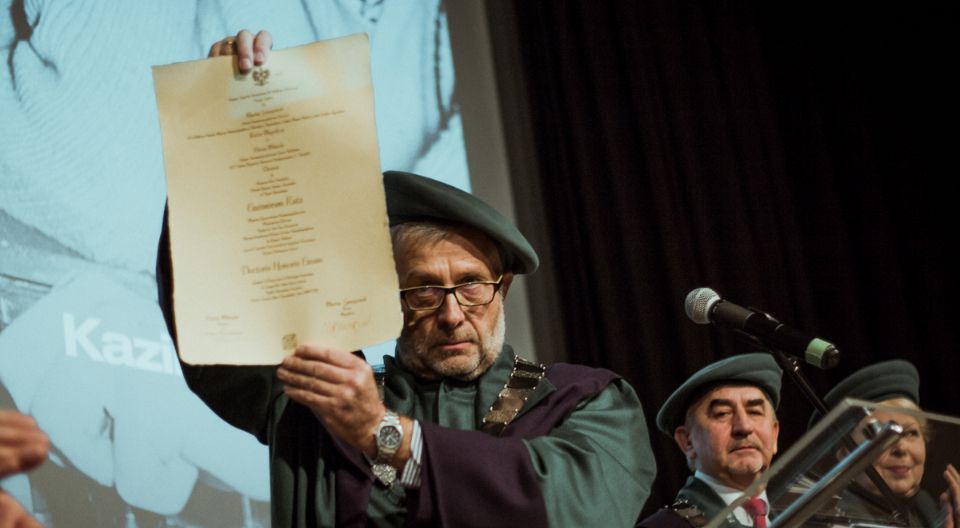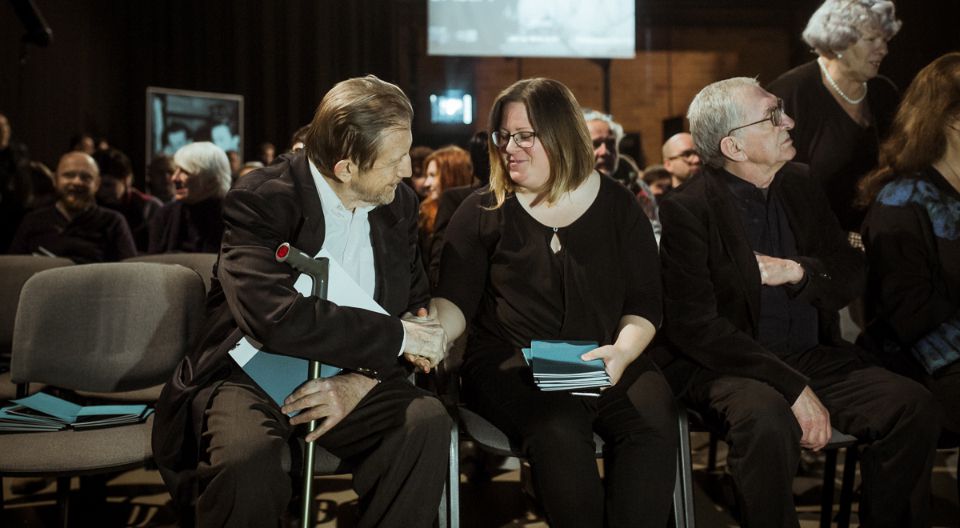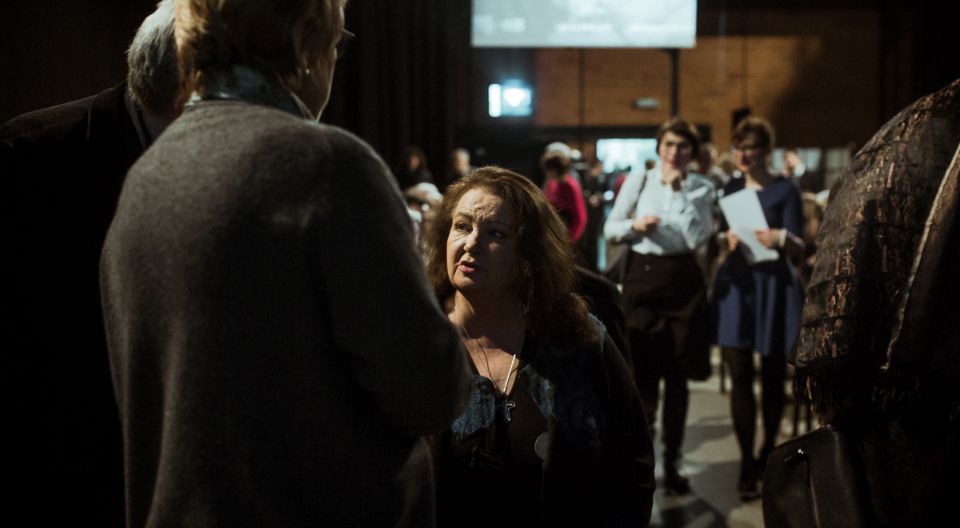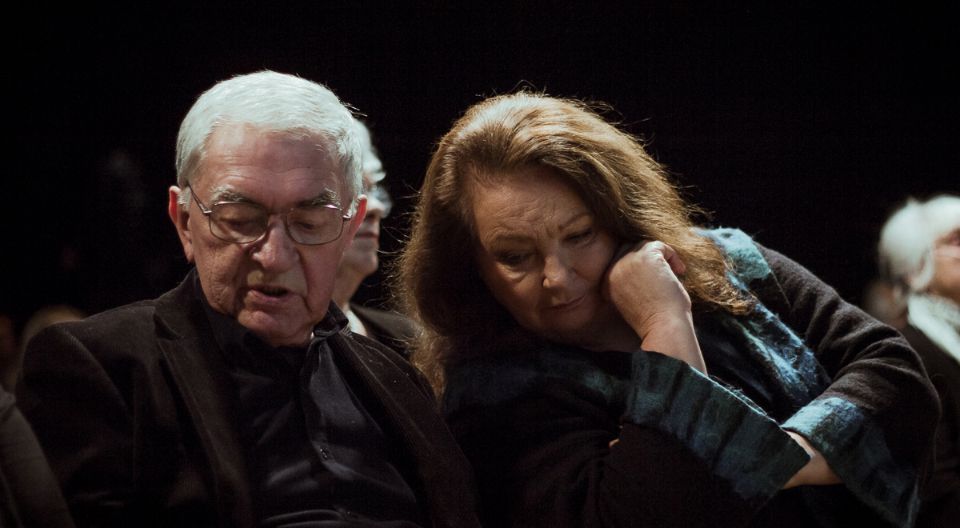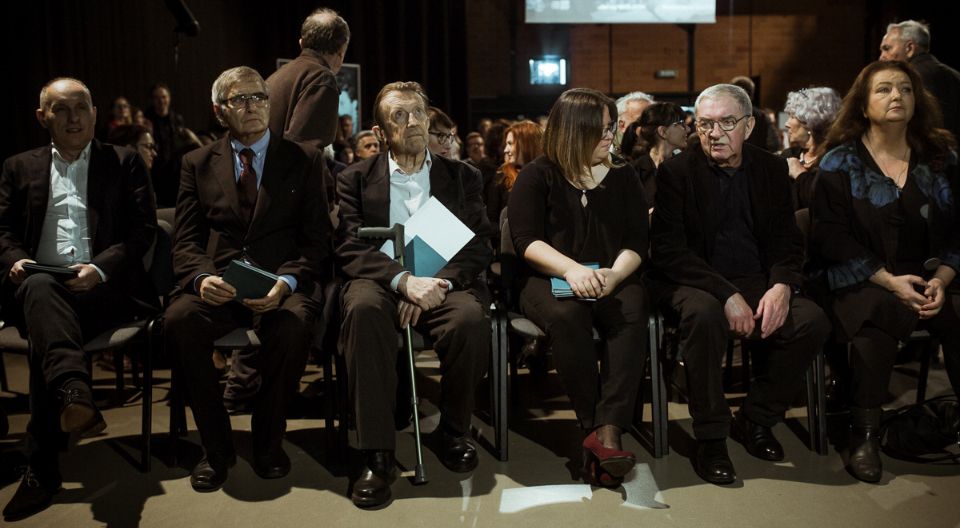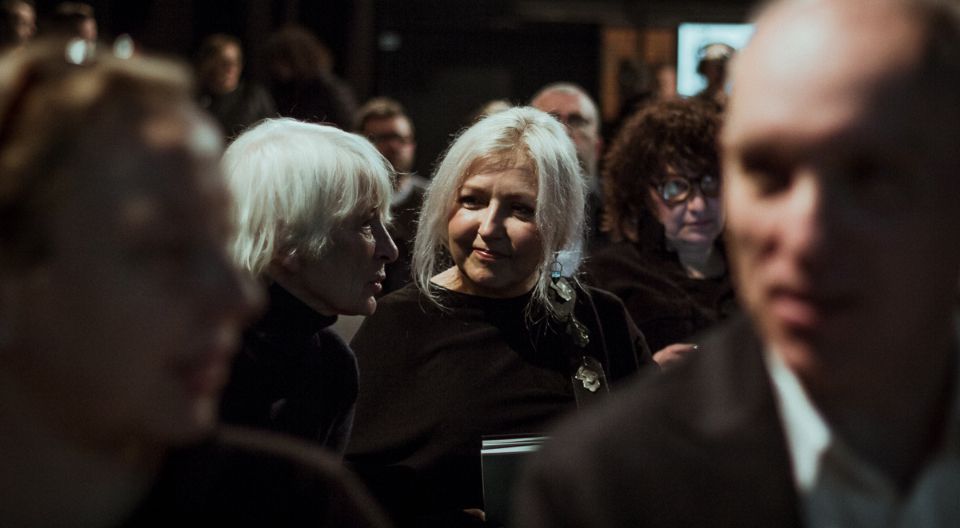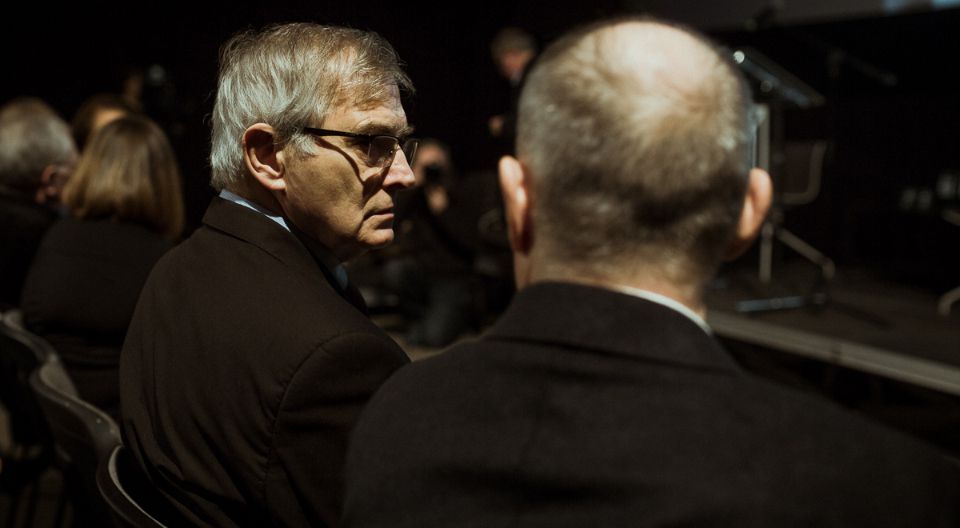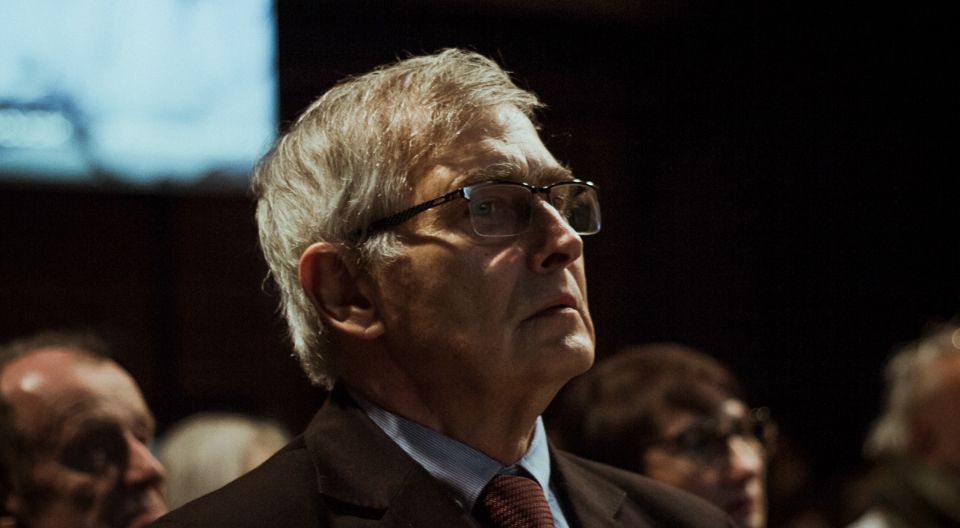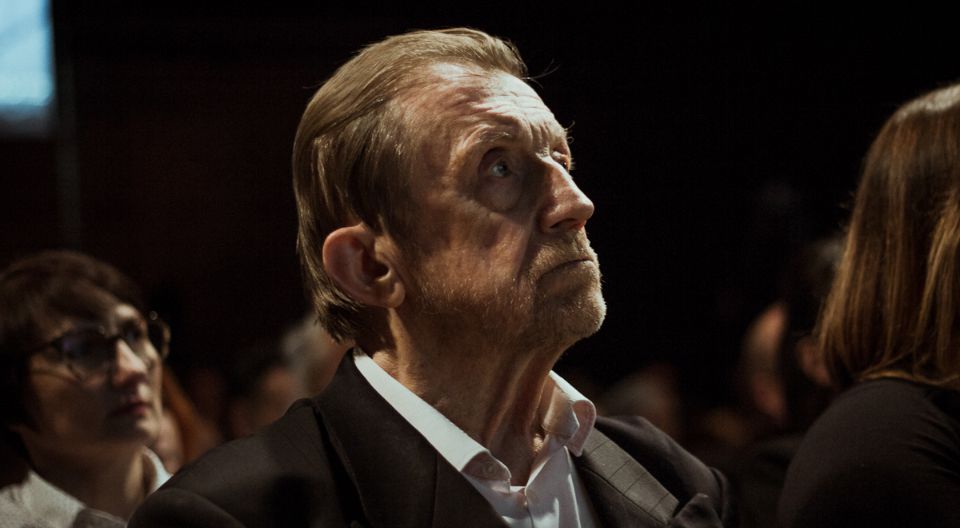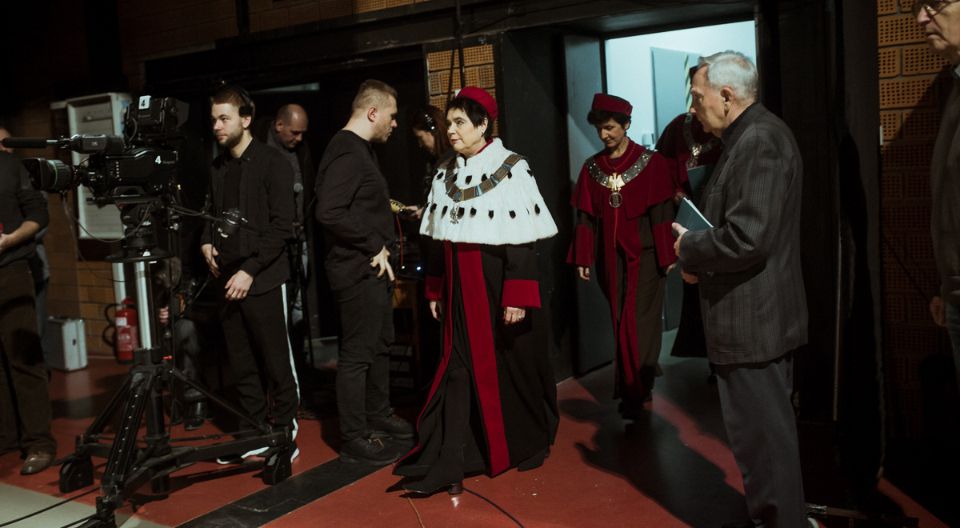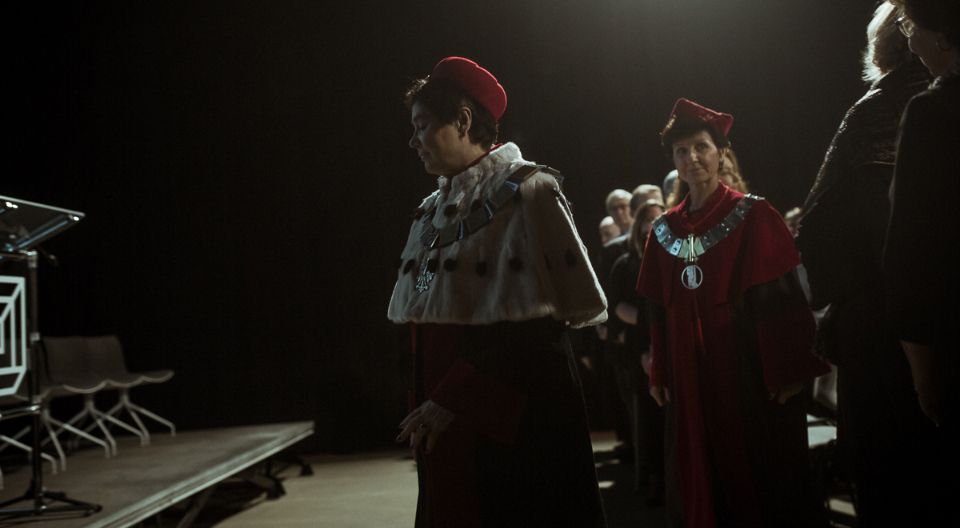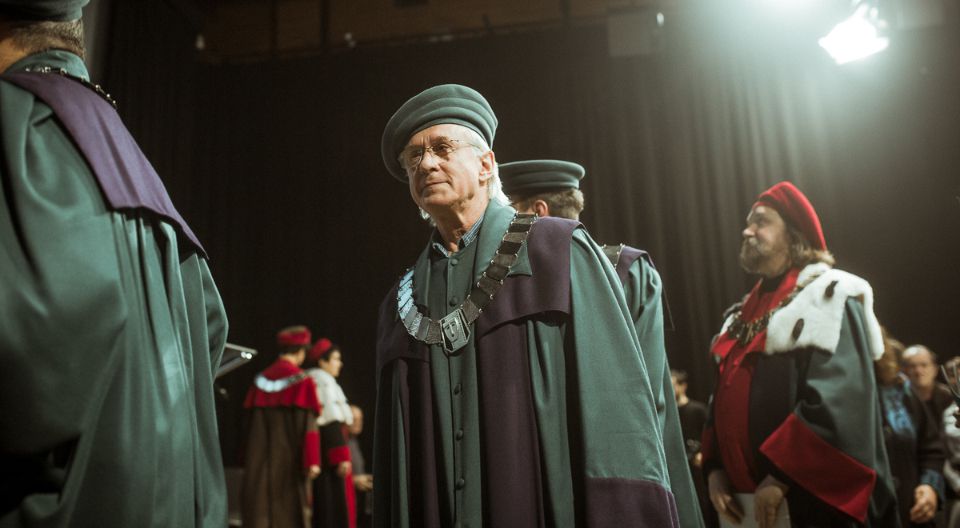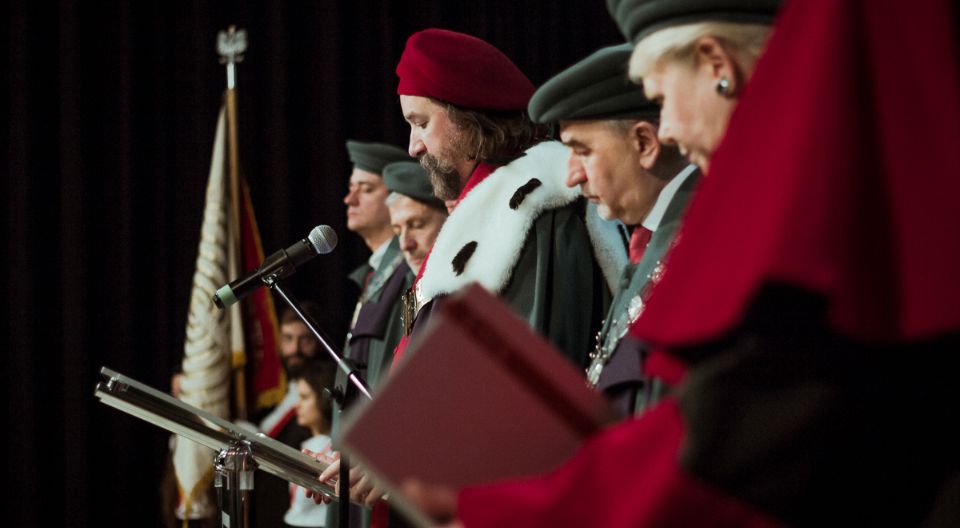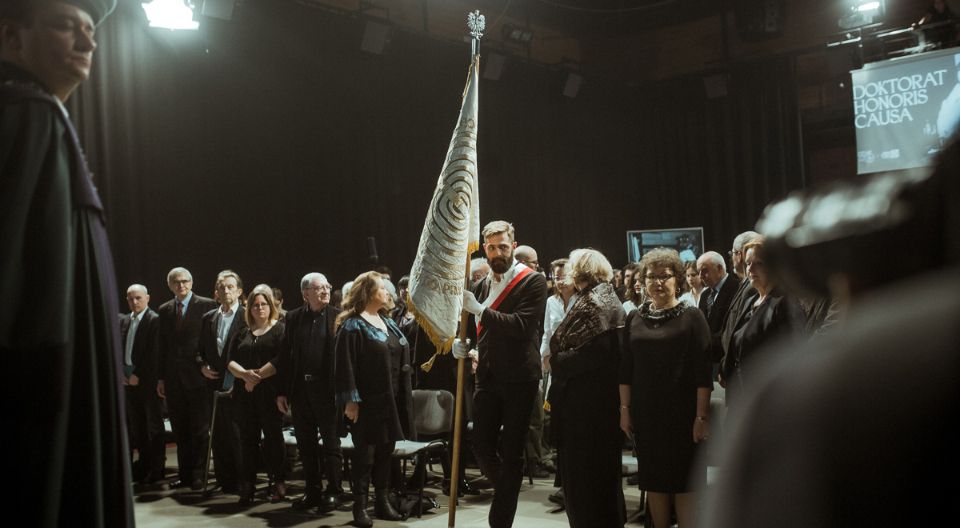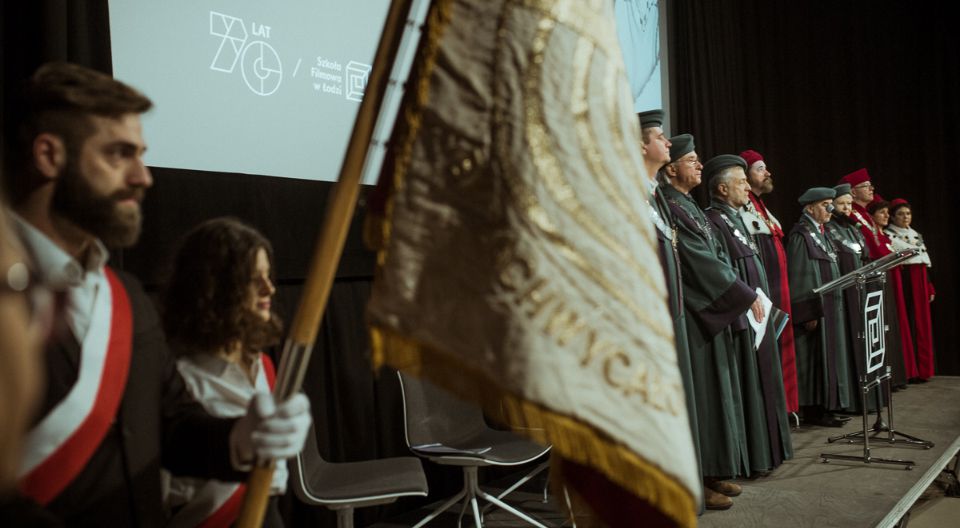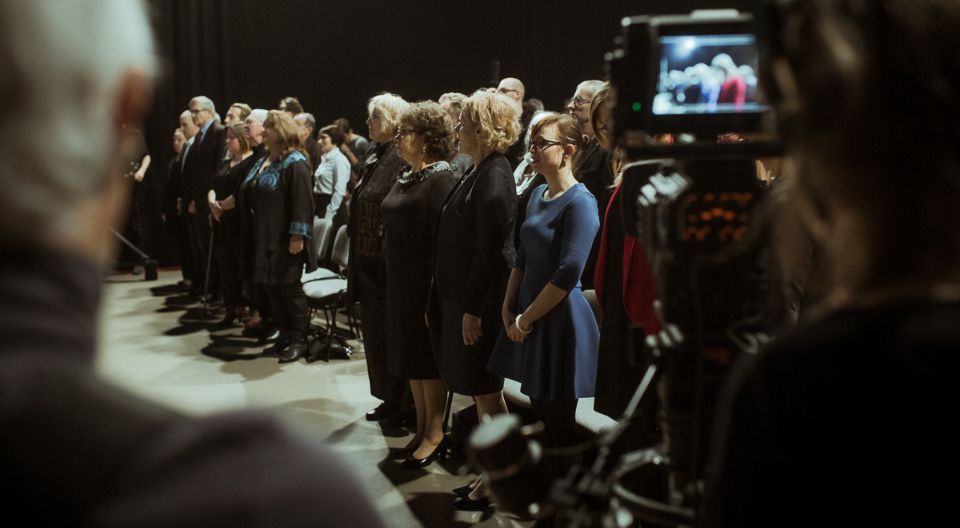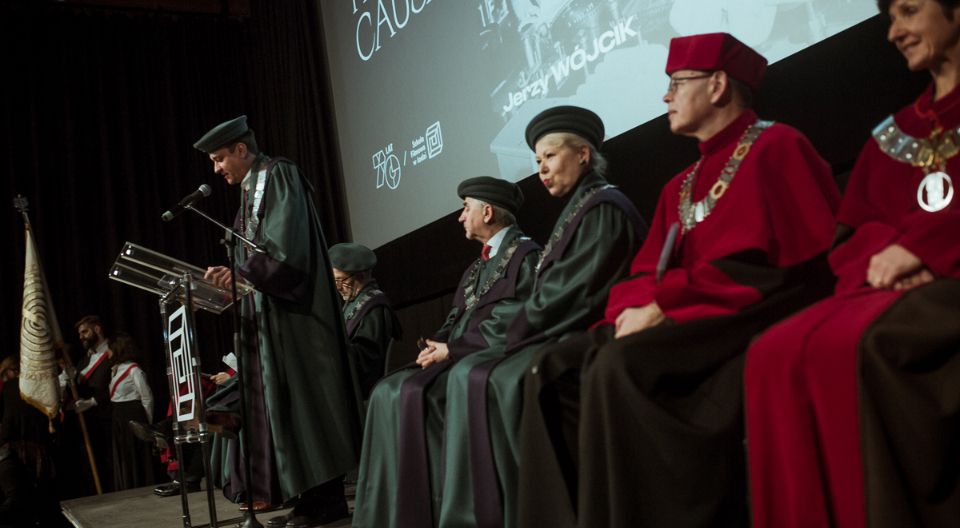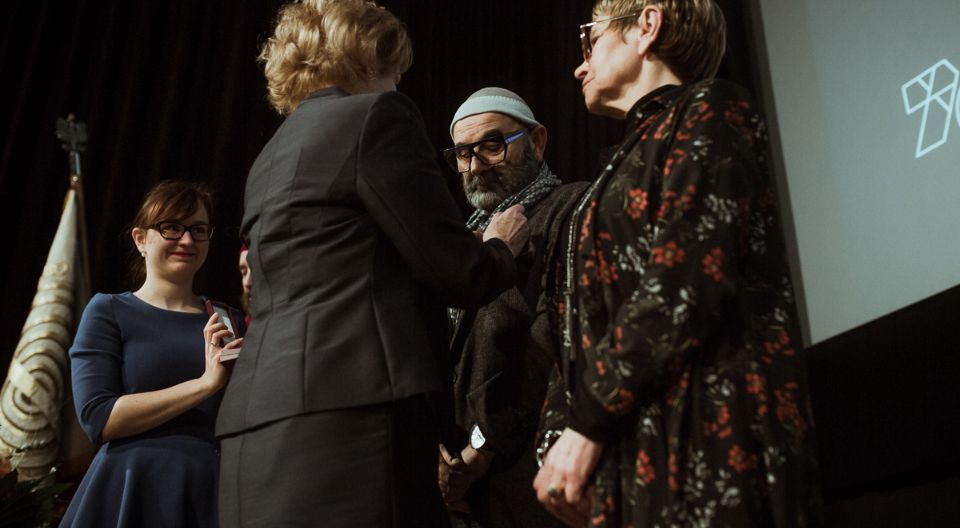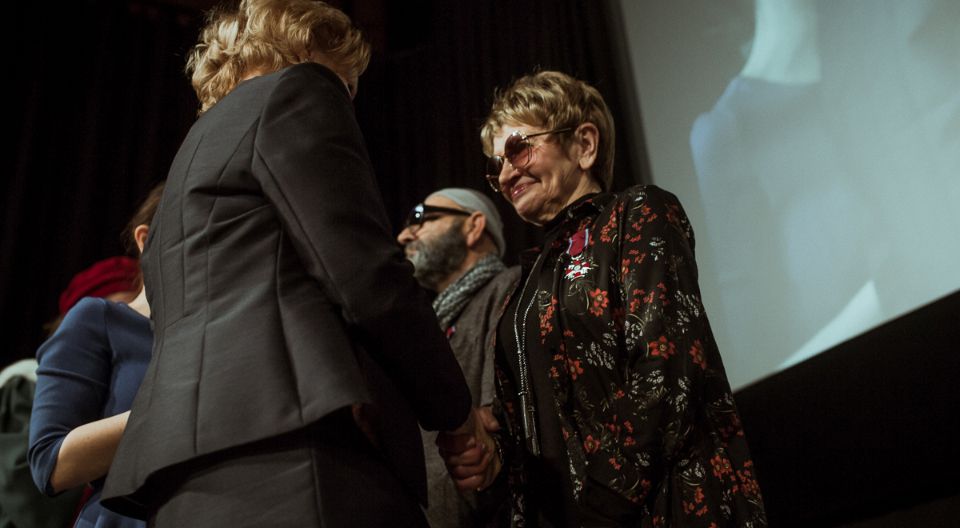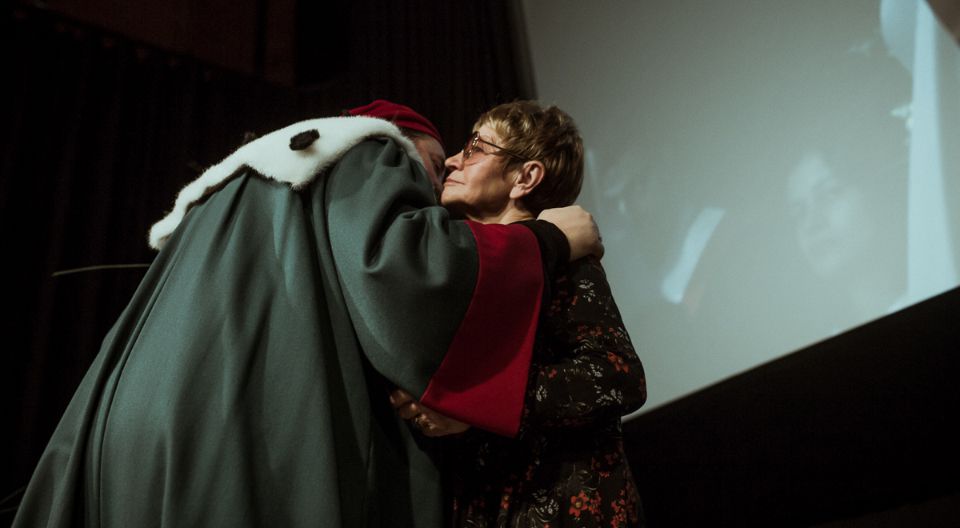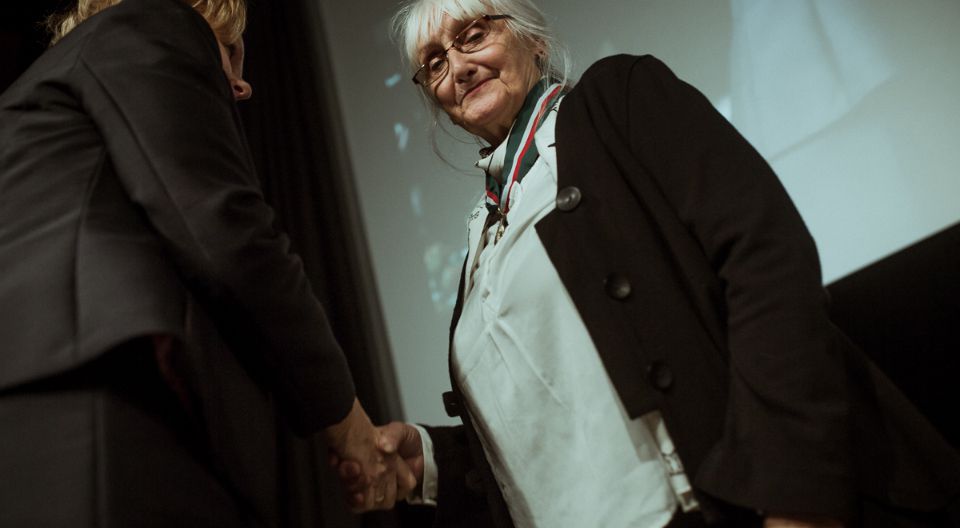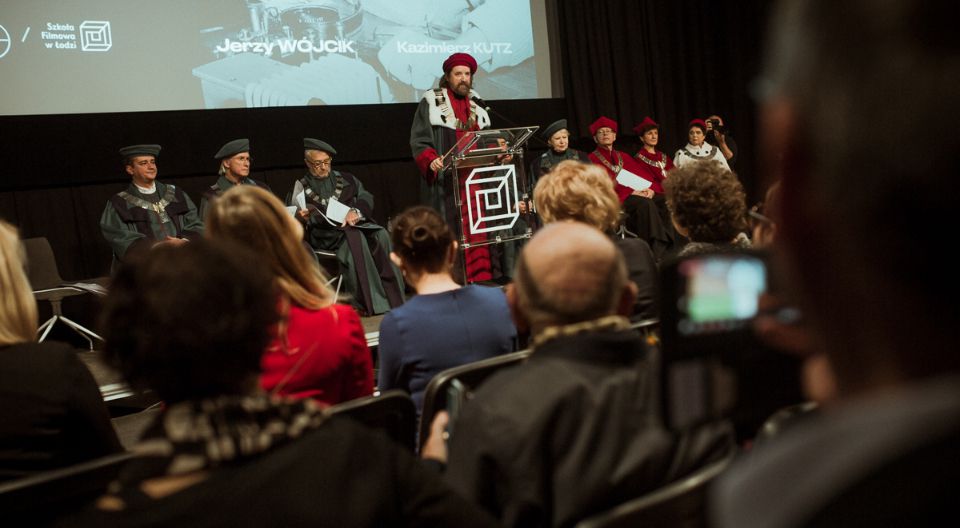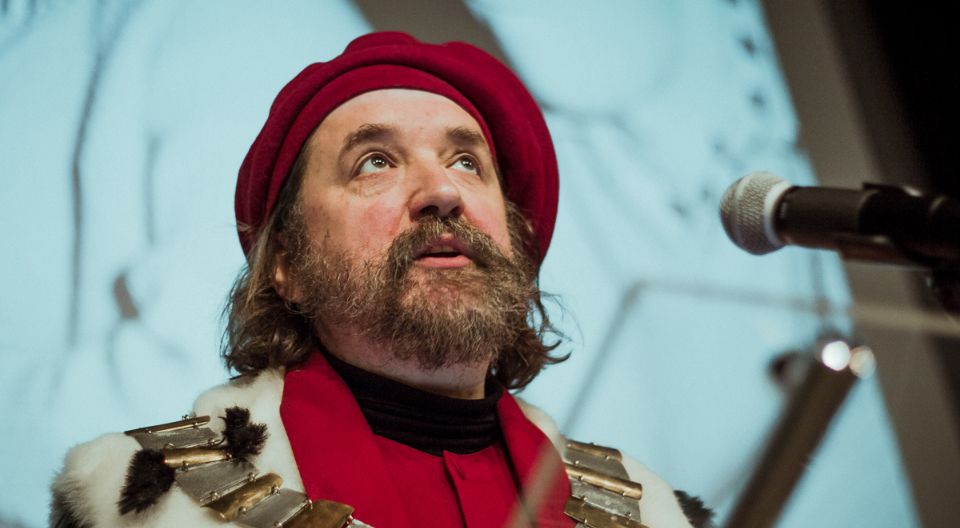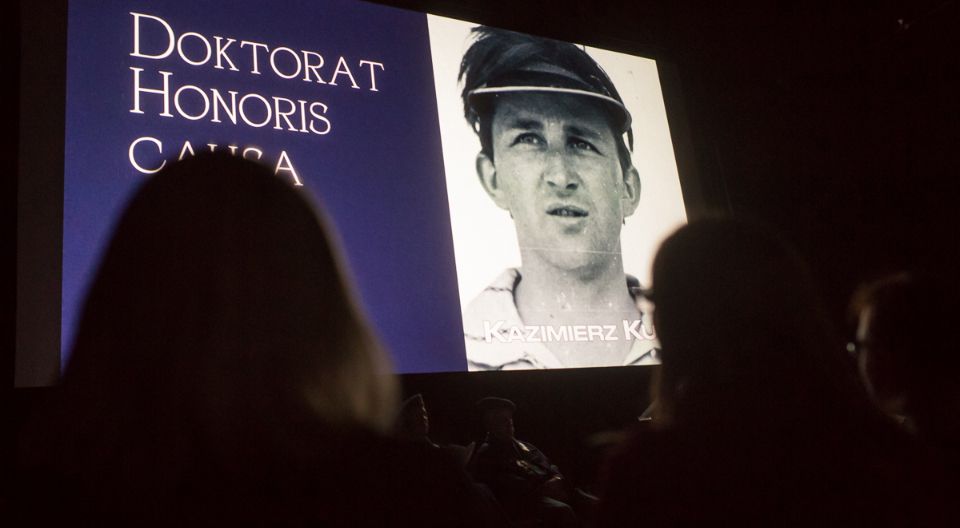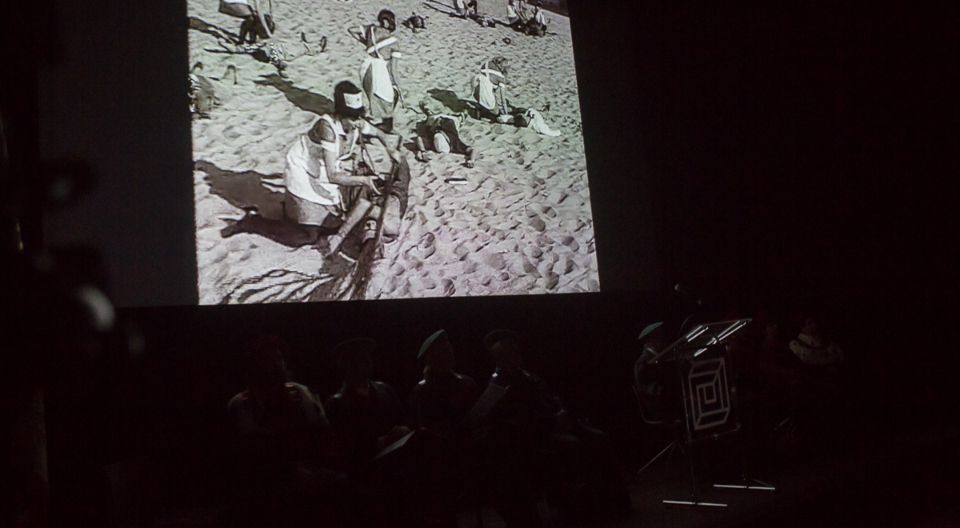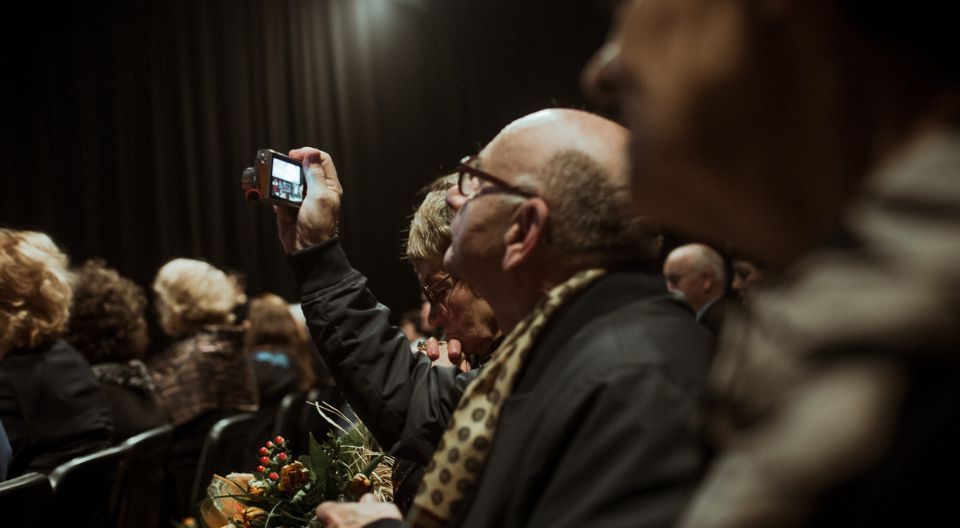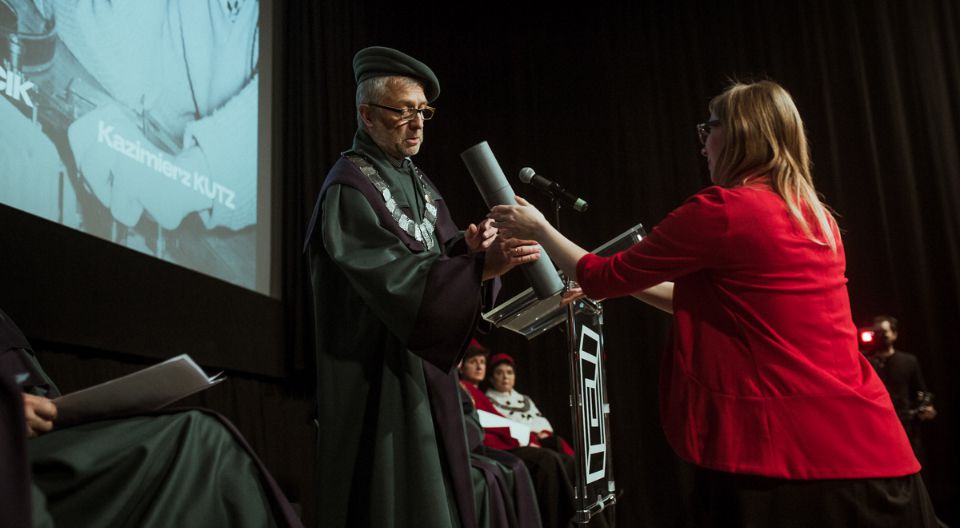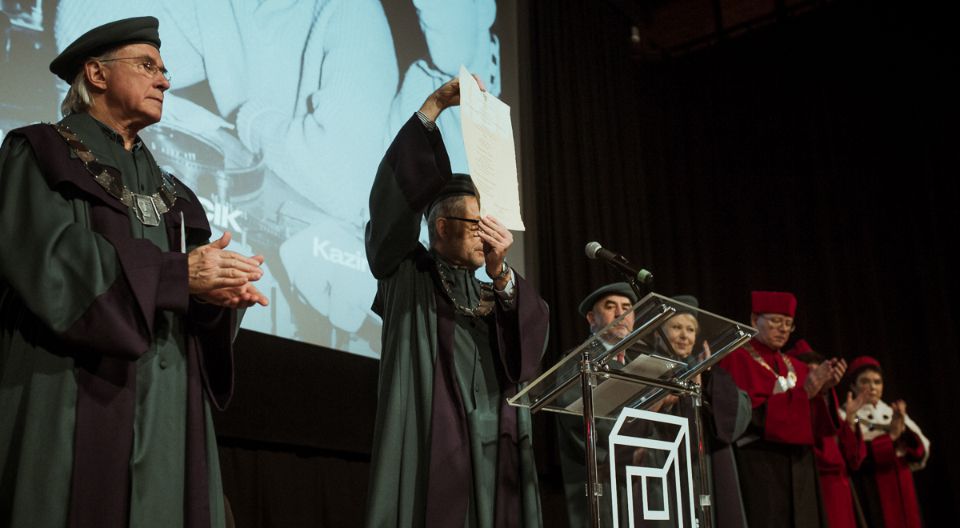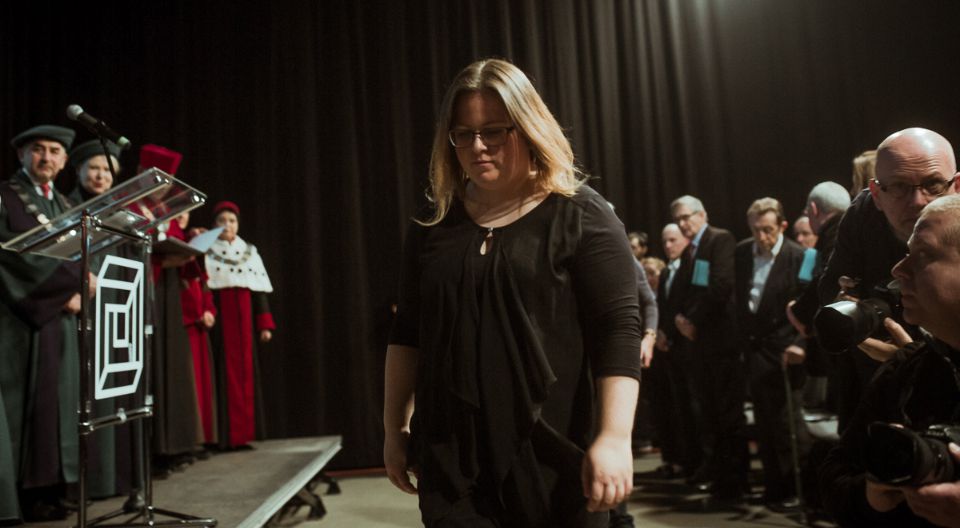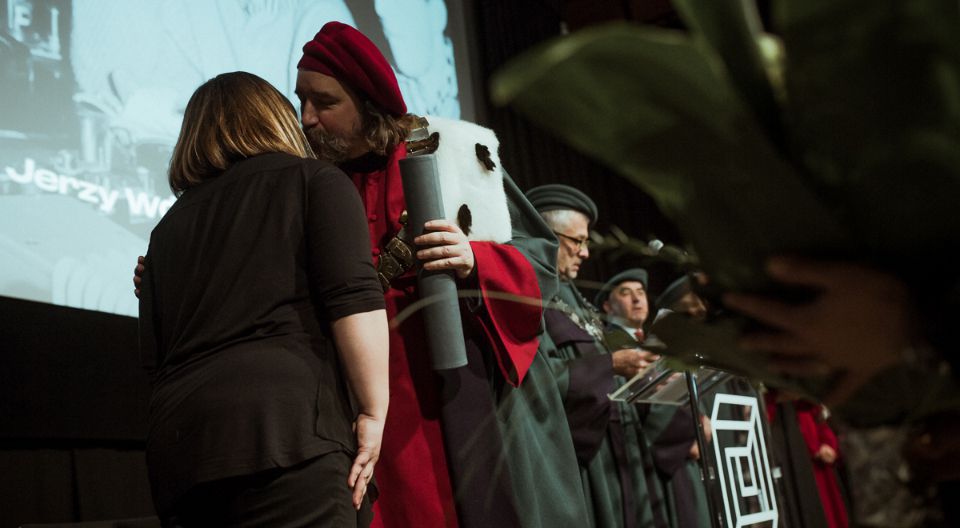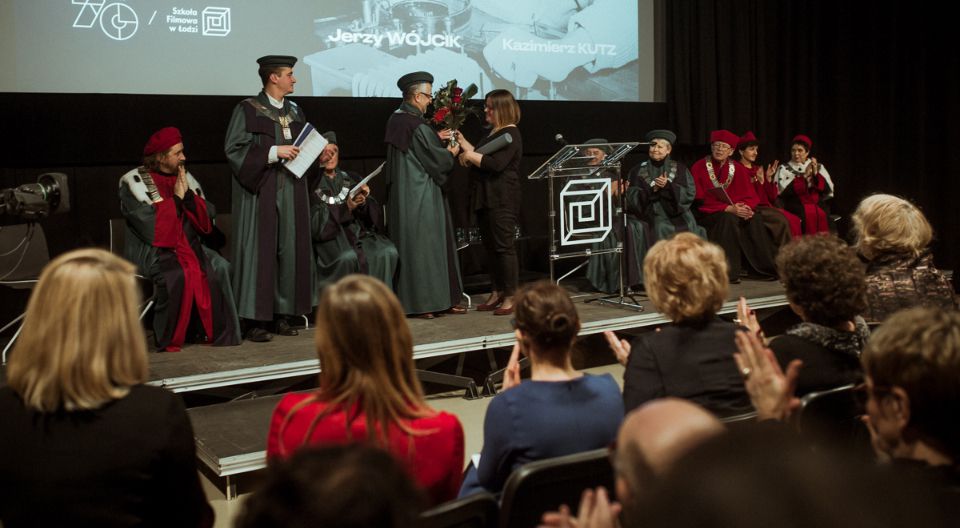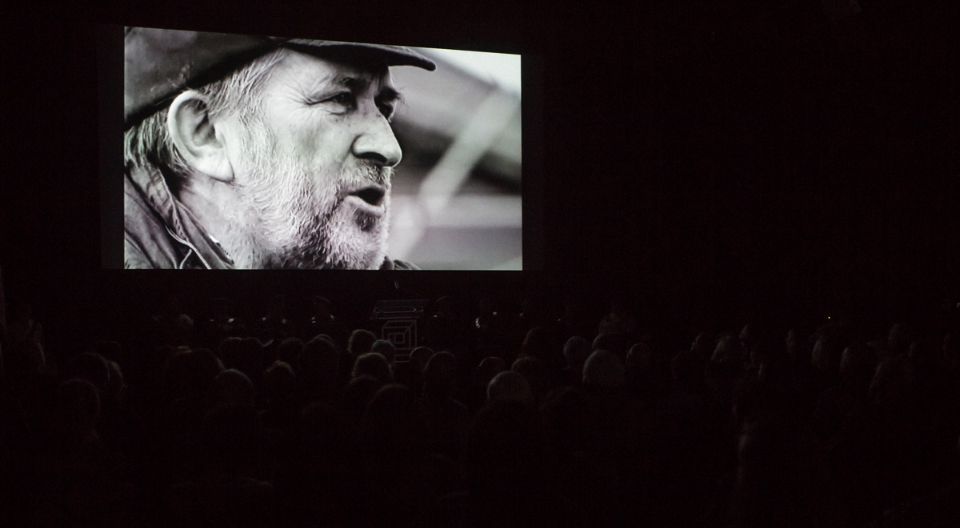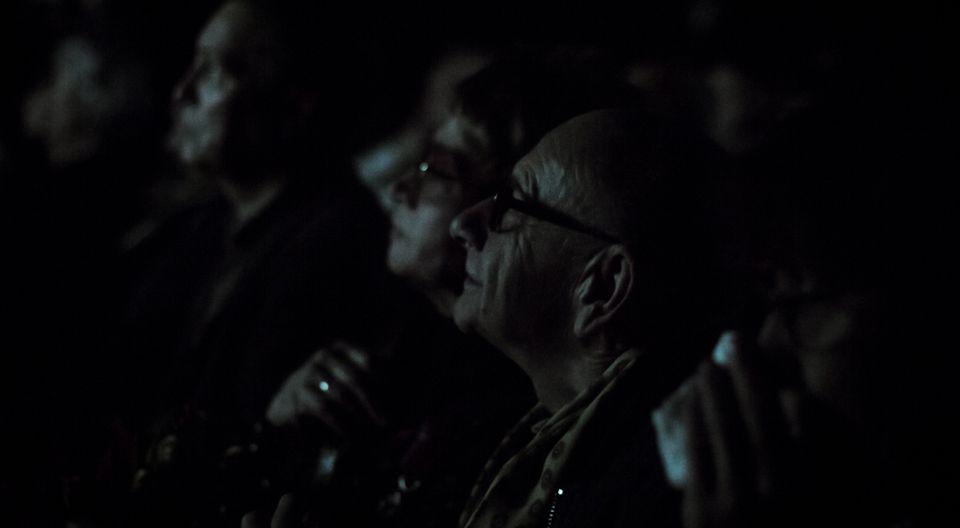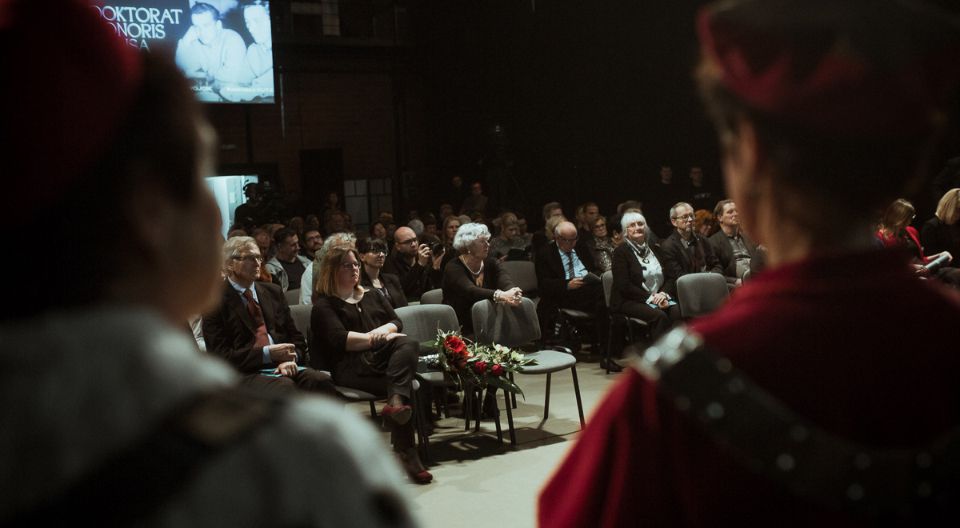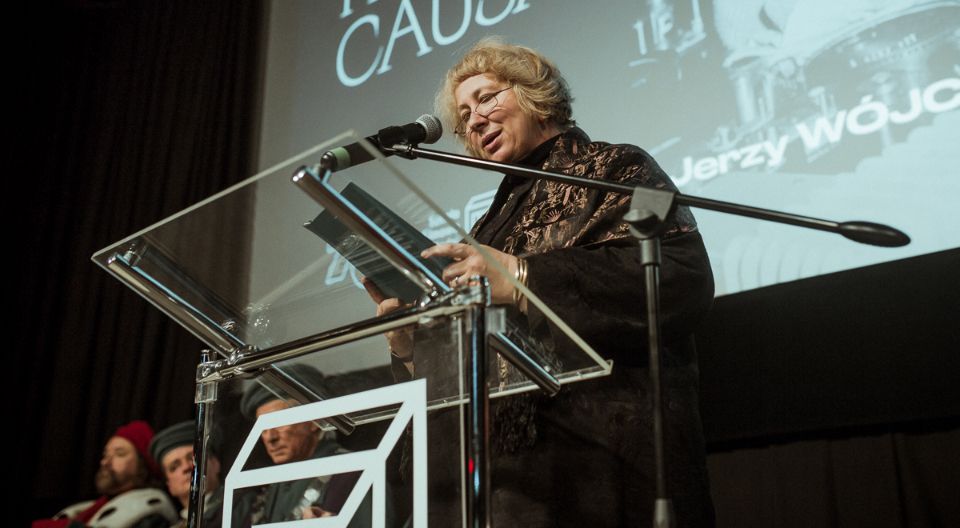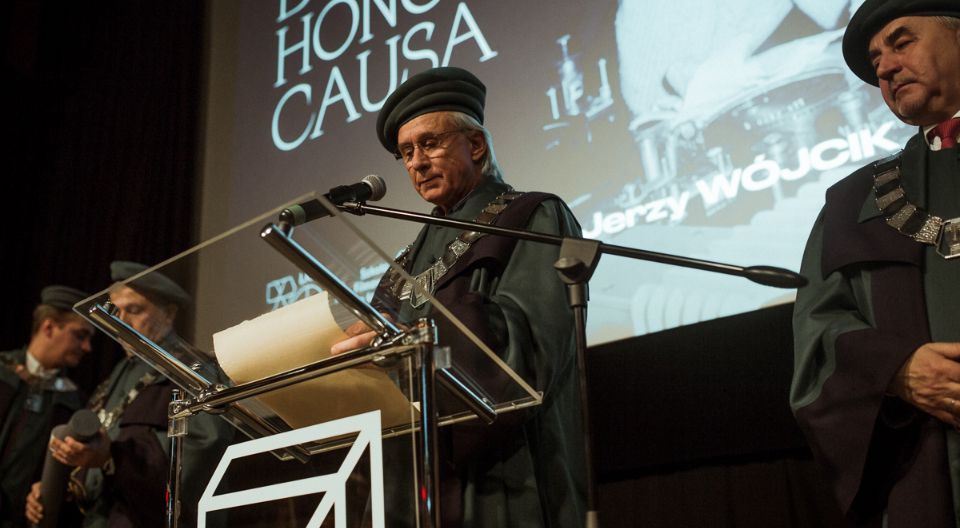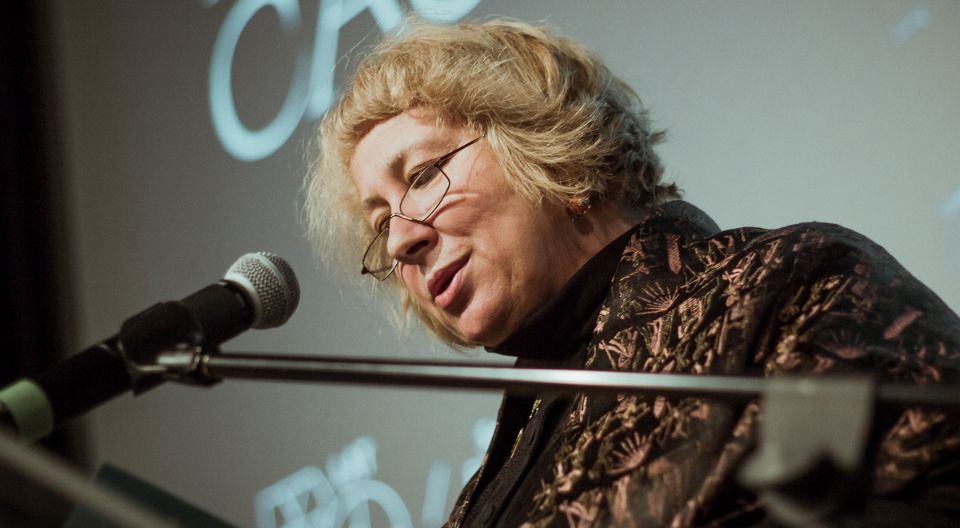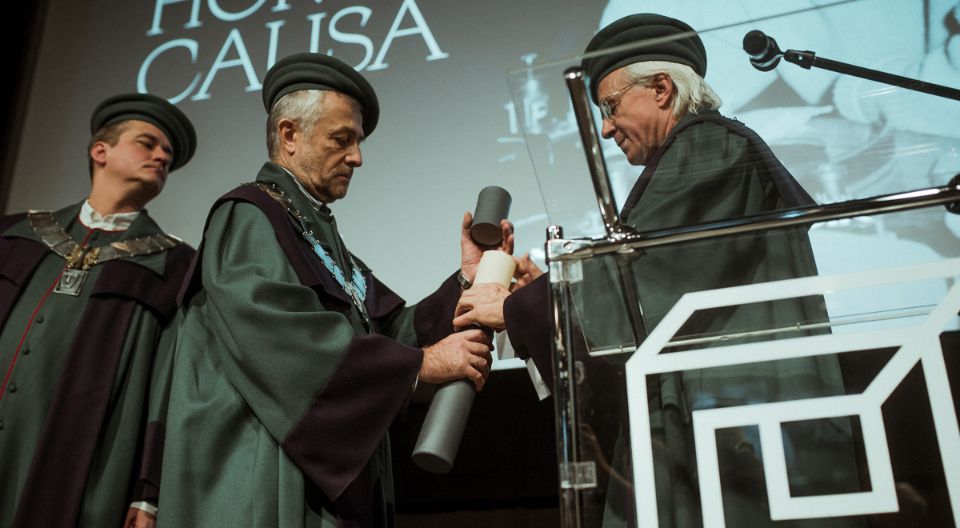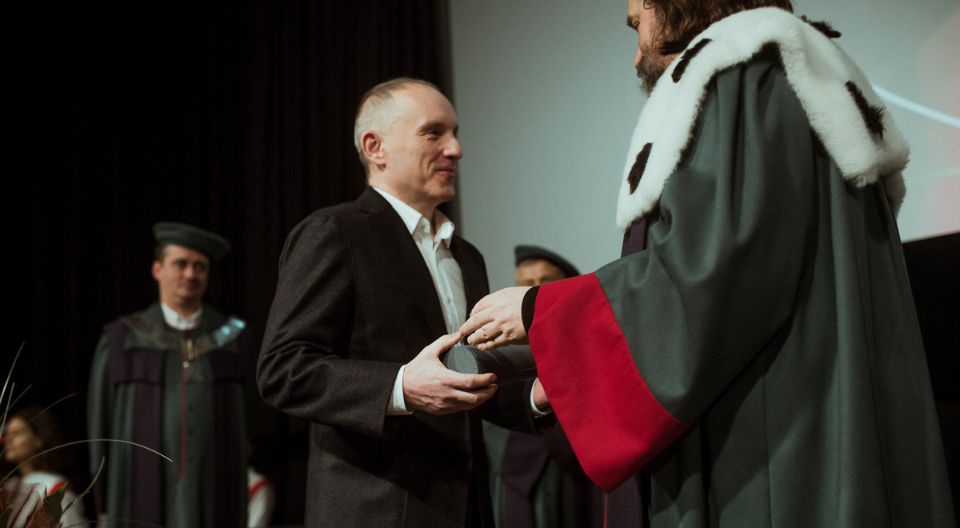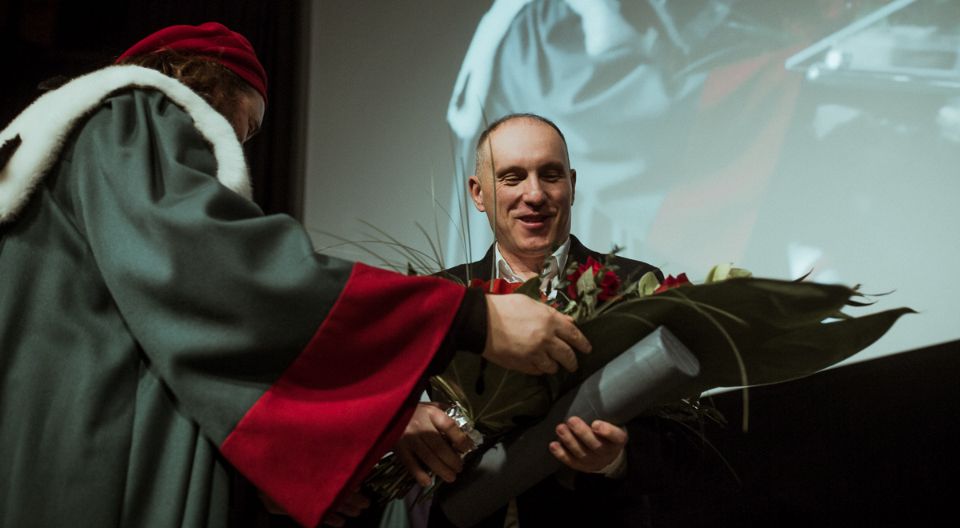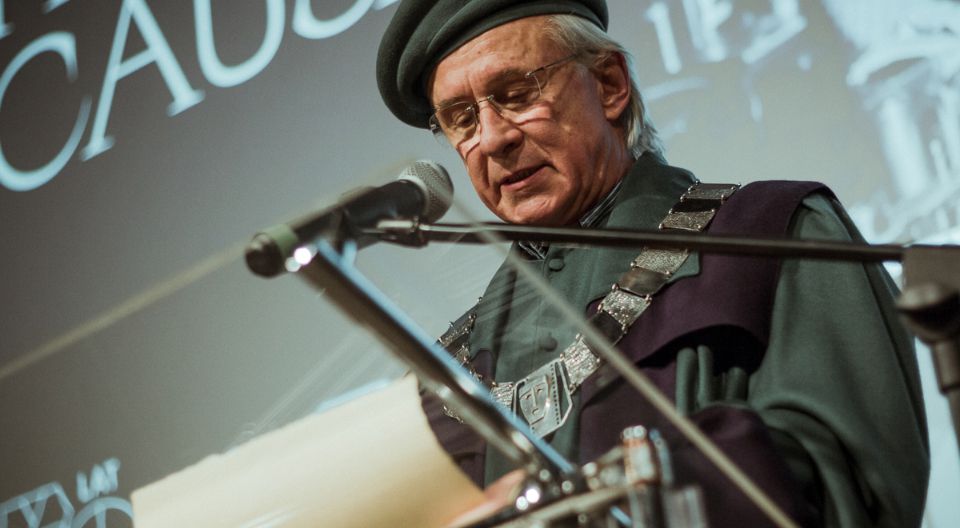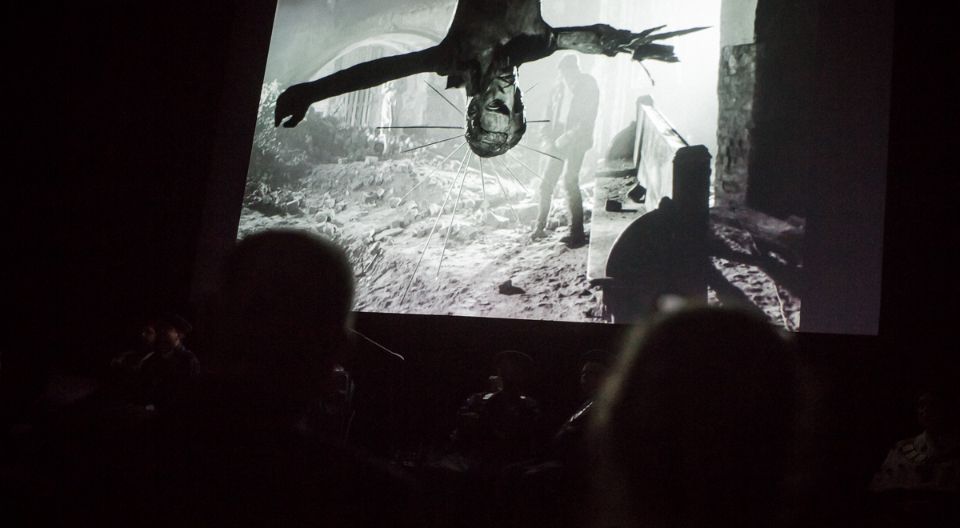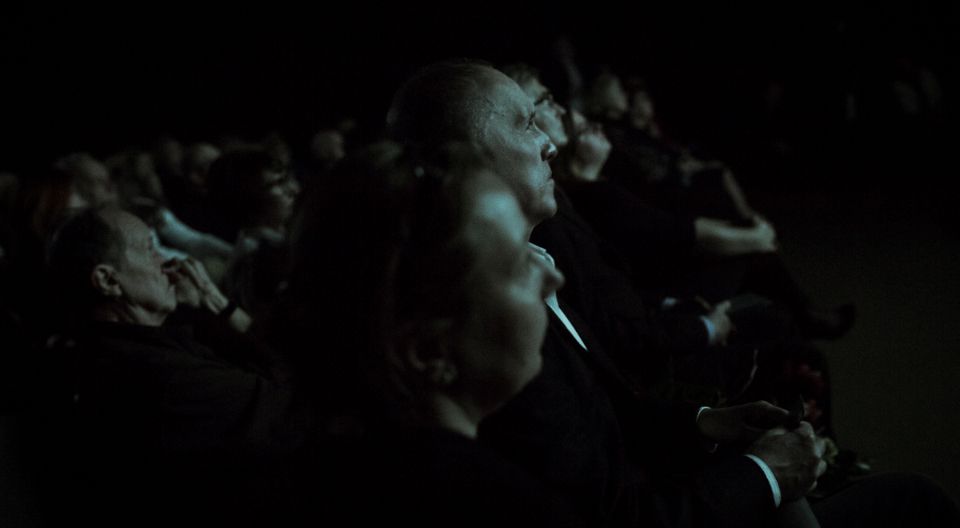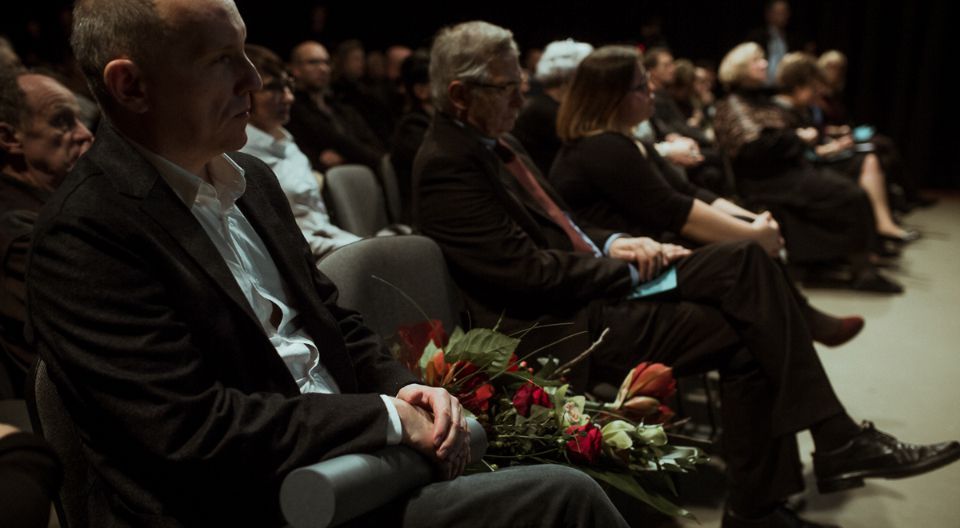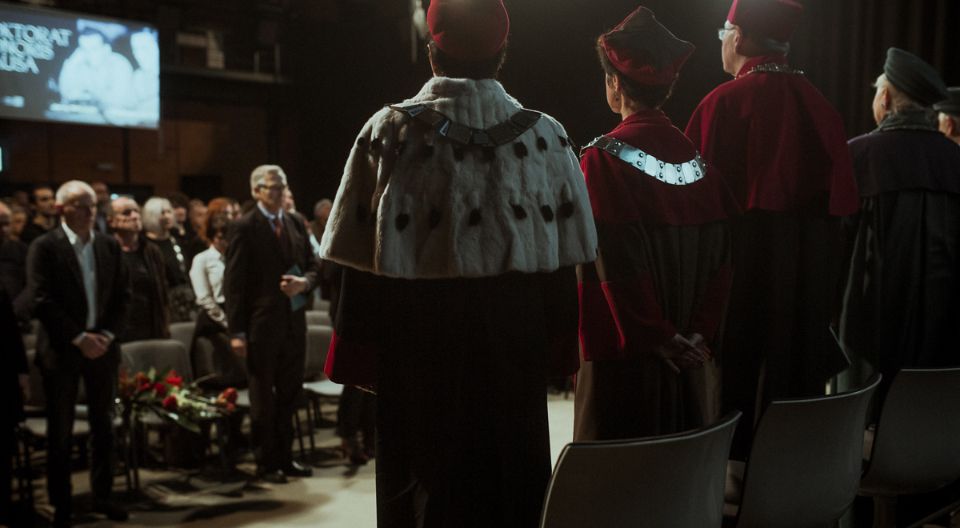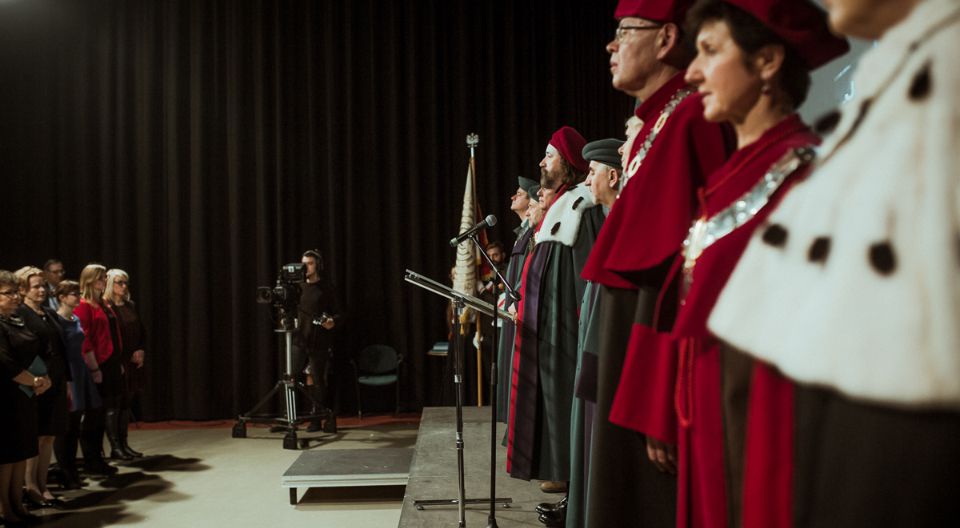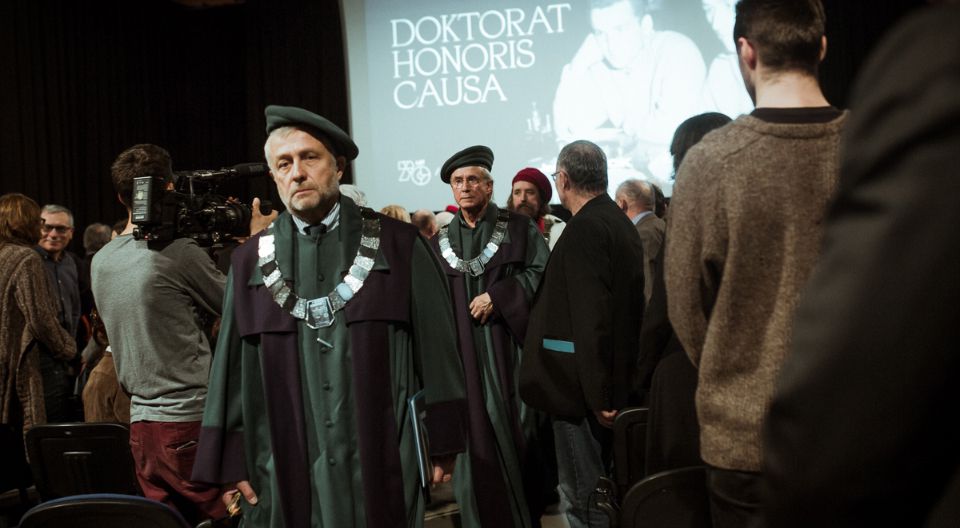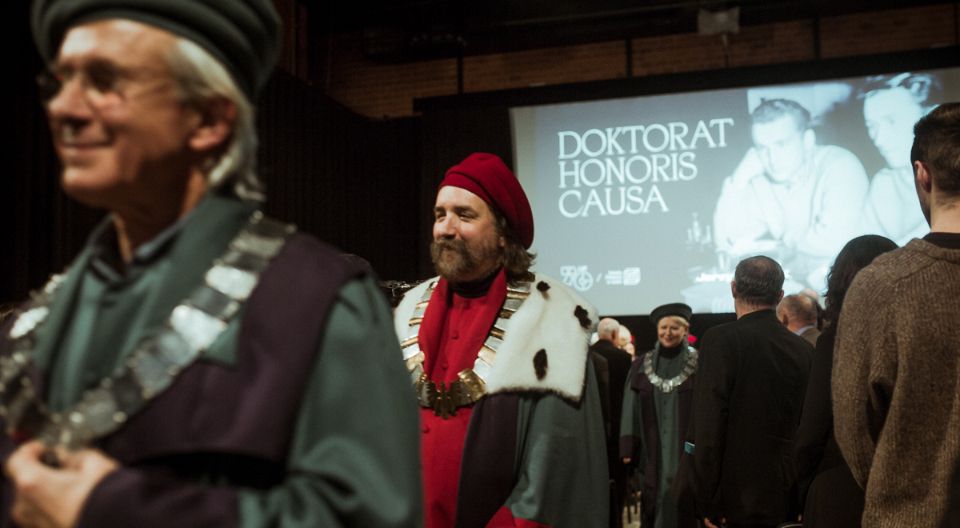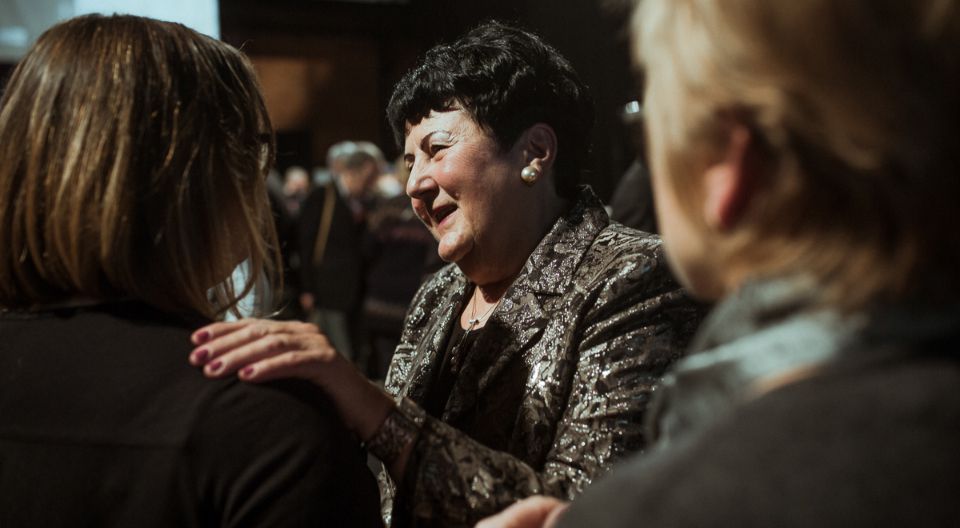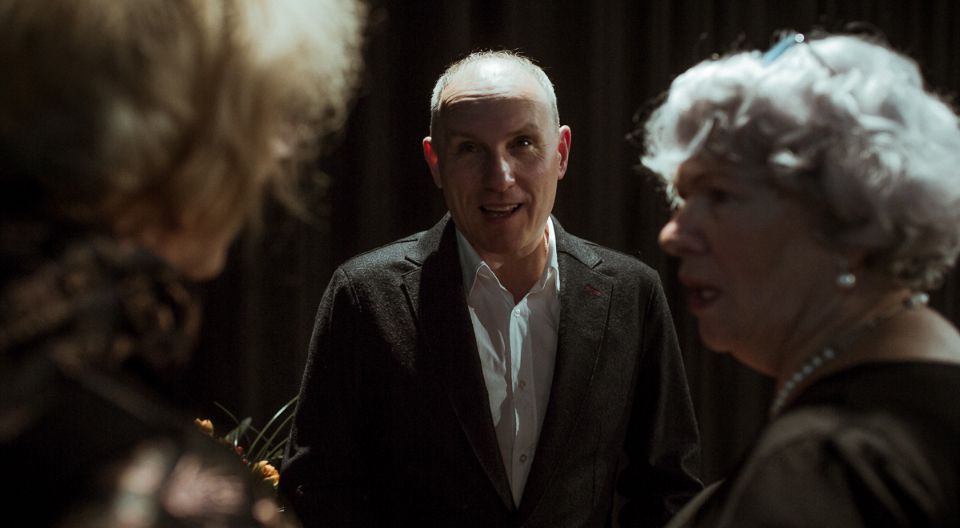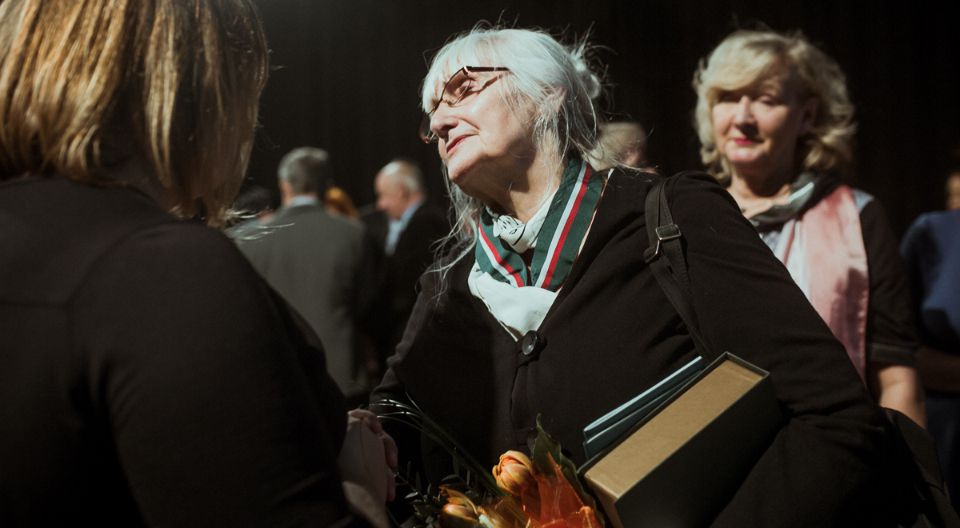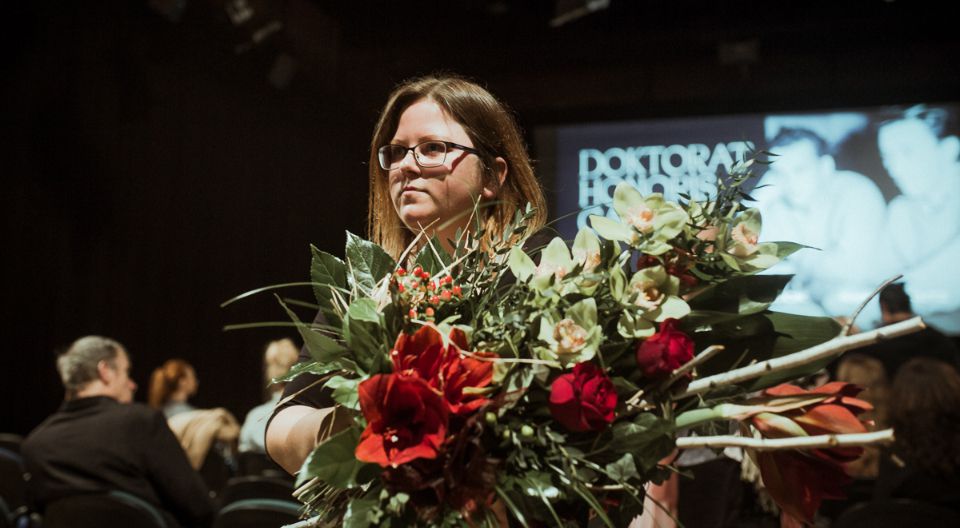13.
12.
2018.
Others
Others
Kazimierz Kutz and Jerzy Wójcik. Great figures of Polish cinema, outstanding film artists, our graduates receive Lodz Film School honorary degrees.
It is a very important day for us and a great honour – the Lodz Film School has granted honorary degrees to great figures of Polish cinema, two out of our most outstanding graduates – Kazimierz Kutz and Jerzy Wójcik.
The guests of the event will be members of their families, their friends from film sets, theatre, among them Anna Dymna, Olgierd Łukaszewicz, Edward Linde-Lubaszenko, Jerzy Trela; their disciples and admirers and the professors and students of our school. The degree laureates, due to their advanced age, could not participate in the ceremony.
‘Especially in these difficult and turbulent times, your presence is a very valuable signpost for us; it does not have to be physical, it can be metaphorical - we feel this presence and I hope that you feel ours’, said Prof. Mariusz Grzegorzek, Rector of the School, commencing the ceremony.
Kazimierz Kutz, a film and theatre director, born in Szopienice, (nowadays a district of Katowice), from today onwards will be a Lodz Film School Doctor Honoris Causa. The films of Kazimierz Kutz, and especially the Sielsian trylogy: "Salt of the Black Earth” (1969), "Pearl in the Crown" (1971) and "The Beads of One Rosary" (1979) constitute an important and unique part of Polish cinema.
On his behalf, the honorary degree was received by the daughter, Wiktoria Kutz-Nazarewicz who said - At this moment, when his life is making a circle, this moment here when his alma mater hugs him, is a symbolic moment and I think that this is the missing pearl in his crown.
The laureate himself spoke to us from the screen. In Wojciech Sarnowicz’s documentary, Kutz, who was in love with literature, especially with Stendhal, was recalling the beginnings of his artistic path. ‘My going to the School was an ersatz. This is also literature - artistic cinema - only pictorial (...). The establishment of the Film School was a sensation. We have created a new field of culture in Poland. The whole world was delighted with us (...) I brought this Silesian theme because all my friends contributed with something personal and the juxtaposition of all these auteur, personal things is Polish cinema. (...) I had a lot to tell.
About the Silesian character of Kutz’s films spoke in the laudation the Dean of Directing Department, Piotr Mikucki, the promoter in the proceedings for the award of the Doctor Honoris Causa degree. - Your film ‘grand mass’ for Silesia is the building of the deepest perceived Christian religiosity. Its founder, if I read the writings of his disciples correctly, wanted to build a community, not to exclude others outside it under the threat of hellfire. The Silesian films of yours, your community rituals, quoted and celebrated by you, are the deepest in my opinion, a religious reflection in the history of Polish cinema.
Reviewers in the proceedings were Prof. Andrzej Gwóźdź from the University of Silesia in Katowice and Prof. Filip Bajon: "Let me Kaziu Honoris Causa…" – that is how Filip Bajon addressed Kutz in his review - "(…) Kazimierz Kutz is an outstanding director with his own artistic and ideological identity. He is also an extremely witty and malicious person whose features many people have been afraid of up to now. But no one like him can talk about Siemianowice, his grandmother and his neighbour, who turned out to be the most outstanding javelin in the world (Janusz Sidło)".
Dean Piotr Mikucki ended the laudation saying:
- You have spent your life, so far at least, doing good. You have worked for the benefit of others, not for your fame only. You have loved and showed beauty in your works, not a magazine type of beauty, but one which is at the interface between the body and the spirit. You have changed the lives of many people for the better. You have not betrayed values that go back to the Bible passed down by your parents, teachers, and friends.
You are not minute like the neutrino. You are the last one of the great ones.
You are our Master.
I thank you for this.
"It's not about making films. The point is that what you do has deep meaning. You must make yourself remembered by the world. I hope that some of my films have become inscribed in the consciousness of the world, I hope", said Jerzy Wójcik from the screen.
Acknowledgment of the honorary title and greetings for all the gathered people was given on behalf of Jerzy Wójcik by his son, Tomasz. Laudation before handing the degree was given by Prof. Jolanta Dylewska:
- Jerzy Wójcik shows us that the visible in cinema serves the purpose to tell about the invisible and records film space and time in the way which opens up internal space, the spirit space. Also through the materiality of this face, this set of many textures, he reaches the interior space of the characters being filmed and observes the changes taking place there. And this is the story of the co-existence of evil and goodness, darkness and light. Because light from the perspective of Jerzy Wójcik is a carrier of a powerful energy going beyond the structure of time and space, and often reaching to regions that are invisible.
Jerzy Wójcik educated a few generations of Polish cinematographers admiring him as the co-author of the most outstanding Polish films of the 1950s and 1960s directed by Andrzej Wajda ("Ashes and Diamonds" 1958, "Samson" 1961), Jerzy Kawalerowicz ("Mother Joan of the Angels" 1961, "Pharaoh" 1965), Kazimierz Kutz ("Cross of Valor" 1959, "Nobody’s Calling" 1960), and Jerzy Hoffman ("The Deluge" 1972).
- I look today at the bright, radiant with inner light, face of Prof. Jerzy Wójcik, the face of my Master, and I find in it an echo of his film choices. And I know that the work of the Professor - films, books, as well as written in us, his students scattered all over the world, a unique philosophy of film image - are inscribed in immortality’. – said Jolanta Dylewska.
Zbigniew Wichłacz, a reviewer in the proceedings, points to the characteristics of the professor: "The existing, written in the words of the Scripture wise sentence that many are called, but few chosen seem to be perfect in this case. The individual features of the professor form the basis of his special personality. One can and should be tempted to mention them. They are an unwavering ethical attitude, sensitivity and imagination, knowledge and goodness, the pursuit of truth and the essence in artistic challenges that have always been of the highest merit ".
After the ceremony, the guests watched the joint work of Kazimierz Kutz and Jerzy Wójcik – the film "Nobody’s Calling" from 1960.
The guests of the event will be members of their families, their friends from film sets, theatre, among them Anna Dymna, Olgierd Łukaszewicz, Edward Linde-Lubaszenko, Jerzy Trela; their disciples and admirers and the professors and students of our school. The degree laureates, due to their advanced age, could not participate in the ceremony.
‘Especially in these difficult and turbulent times, your presence is a very valuable signpost for us; it does not have to be physical, it can be metaphorical - we feel this presence and I hope that you feel ours’, said Prof. Mariusz Grzegorzek, Rector of the School, commencing the ceremony.
Kazimierz Kutz, a film and theatre director, born in Szopienice, (nowadays a district of Katowice), from today onwards will be a Lodz Film School Doctor Honoris Causa. The films of Kazimierz Kutz, and especially the Sielsian trylogy: "Salt of the Black Earth” (1969), "Pearl in the Crown" (1971) and "The Beads of One Rosary" (1979) constitute an important and unique part of Polish cinema.
On his behalf, the honorary degree was received by the daughter, Wiktoria Kutz-Nazarewicz who said - At this moment, when his life is making a circle, this moment here when his alma mater hugs him, is a symbolic moment and I think that this is the missing pearl in his crown.
The laureate himself spoke to us from the screen. In Wojciech Sarnowicz’s documentary, Kutz, who was in love with literature, especially with Stendhal, was recalling the beginnings of his artistic path. ‘My going to the School was an ersatz. This is also literature - artistic cinema - only pictorial (...). The establishment of the Film School was a sensation. We have created a new field of culture in Poland. The whole world was delighted with us (...) I brought this Silesian theme because all my friends contributed with something personal and the juxtaposition of all these auteur, personal things is Polish cinema. (...) I had a lot to tell.
About the Silesian character of Kutz’s films spoke in the laudation the Dean of Directing Department, Piotr Mikucki, the promoter in the proceedings for the award of the Doctor Honoris Causa degree. - Your film ‘grand mass’ for Silesia is the building of the deepest perceived Christian religiosity. Its founder, if I read the writings of his disciples correctly, wanted to build a community, not to exclude others outside it under the threat of hellfire. The Silesian films of yours, your community rituals, quoted and celebrated by you, are the deepest in my opinion, a religious reflection in the history of Polish cinema.
Reviewers in the proceedings were Prof. Andrzej Gwóźdź from the University of Silesia in Katowice and Prof. Filip Bajon: "Let me Kaziu Honoris Causa…" – that is how Filip Bajon addressed Kutz in his review - "(…) Kazimierz Kutz is an outstanding director with his own artistic and ideological identity. He is also an extremely witty and malicious person whose features many people have been afraid of up to now. But no one like him can talk about Siemianowice, his grandmother and his neighbour, who turned out to be the most outstanding javelin in the world (Janusz Sidło)".
Dean Piotr Mikucki ended the laudation saying:
- You have spent your life, so far at least, doing good. You have worked for the benefit of others, not for your fame only. You have loved and showed beauty in your works, not a magazine type of beauty, but one which is at the interface between the body and the spirit. You have changed the lives of many people for the better. You have not betrayed values that go back to the Bible passed down by your parents, teachers, and friends.
You are not minute like the neutrino. You are the last one of the great ones.
You are our Master.
I thank you for this.
"It's not about making films. The point is that what you do has deep meaning. You must make yourself remembered by the world. I hope that some of my films have become inscribed in the consciousness of the world, I hope", said Jerzy Wójcik from the screen.
Acknowledgment of the honorary title and greetings for all the gathered people was given on behalf of Jerzy Wójcik by his son, Tomasz. Laudation before handing the degree was given by Prof. Jolanta Dylewska:
- Jerzy Wójcik shows us that the visible in cinema serves the purpose to tell about the invisible and records film space and time in the way which opens up internal space, the spirit space. Also through the materiality of this face, this set of many textures, he reaches the interior space of the characters being filmed and observes the changes taking place there. And this is the story of the co-existence of evil and goodness, darkness and light. Because light from the perspective of Jerzy Wójcik is a carrier of a powerful energy going beyond the structure of time and space, and often reaching to regions that are invisible.
Jerzy Wójcik educated a few generations of Polish cinematographers admiring him as the co-author of the most outstanding Polish films of the 1950s and 1960s directed by Andrzej Wajda ("Ashes and Diamonds" 1958, "Samson" 1961), Jerzy Kawalerowicz ("Mother Joan of the Angels" 1961, "Pharaoh" 1965), Kazimierz Kutz ("Cross of Valor" 1959, "Nobody’s Calling" 1960), and Jerzy Hoffman ("The Deluge" 1972).
- I look today at the bright, radiant with inner light, face of Prof. Jerzy Wójcik, the face of my Master, and I find in it an echo of his film choices. And I know that the work of the Professor - films, books, as well as written in us, his students scattered all over the world, a unique philosophy of film image - are inscribed in immortality’. – said Jolanta Dylewska.
Zbigniew Wichłacz, a reviewer in the proceedings, points to the characteristics of the professor: "The existing, written in the words of the Scripture wise sentence that many are called, but few chosen seem to be perfect in this case. The individual features of the professor form the basis of his special personality. One can and should be tempted to mention them. They are an unwavering ethical attitude, sensitivity and imagination, knowledge and goodness, the pursuit of truth and the essence in artistic challenges that have always been of the highest merit ".
After the ceremony, the guests watched the joint work of Kazimierz Kutz and Jerzy Wójcik – the film "Nobody’s Calling" from 1960.
